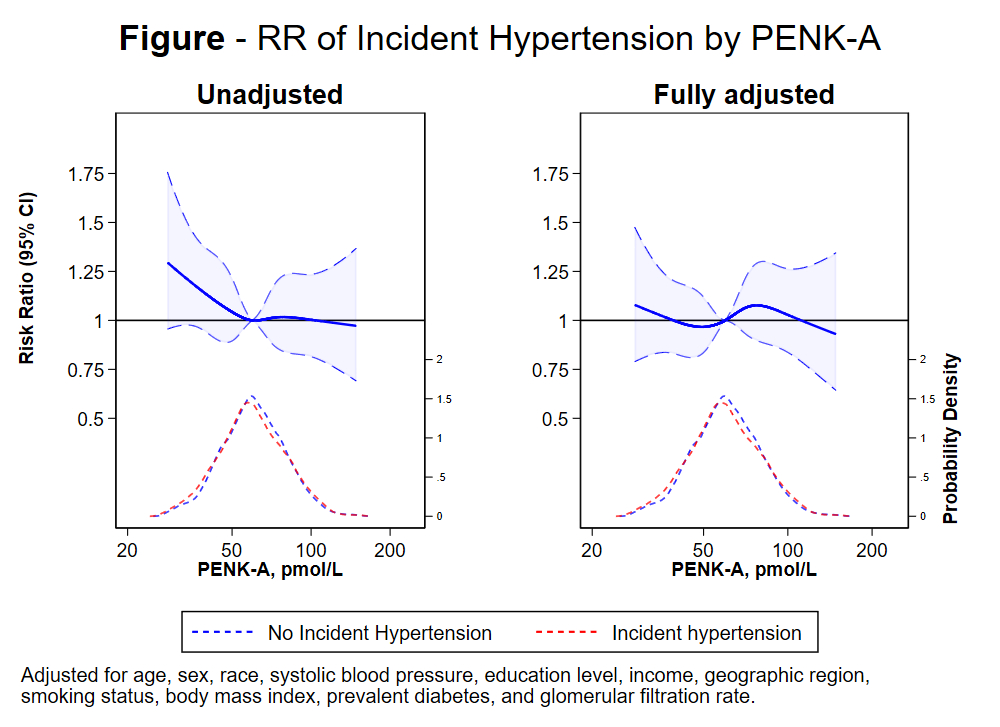Final ID: P3077
Pro-Enkephalin A and Risk of Incident Hypertension: The REasons for Geographic and Racial Differences in Stroke (REGARDS) Study
Abstract Body: Introduction: Hypertension, a risk factor for cardiovascular disease and chronic kidney disease, poses a significant burden in the U.S, especially among Black U.S. adults. Higher pro-enkephalin A (PENK-A), a byproduct of endogenous opioid peptide processing and a novel marker for estimation of glomerular filtration rate, is associated with antihypertensive use and greater risk of stroke, heart failure, and renal dysfunction. Whether low PENK-A is a risk factor for incident hypertension is unknown.
Hypotheses: We hypothesized that lower PENK-A will be associated with greater risk of incident hypertension.
Methods: REGARDS cohort study enrolled 30,239 Black and White U.S adults aged ≥45 years, with an initial visit between 2003-2007 and a follow-up visit in 2013-2016. A race-sex stratified sample of 4,400 participants were randomly selected. Hypertension was defined with a blood pressure (BP) threshold of 140/90 mm Hg or use of antihypertensive medications. We excluded those with prevalent hypertension, missing model covariates, or missing PENK-A, resulting in an analytical population of 1,859 participants. Proportion of incident hypertension events were calculated by tertile of PENK-A. Modified Poisson regression estimated unadjusted and adjusted risk ratios (RR) of incident hypertension per 1-SD higher of log-transformed PENK-A.
Results: Among 1,859 participants (mean [SD] age 62 [8] years, 51% female, and 36% Black race), median (IQR) follow up was 9.5 (8.7 to 10.0) years. Median (IQR) PENK-A was 59.7 (49.6-72.4) pmol/L. Hypertension developed in 35.4% of participants overall, (37.7% of tertile 1, 34.9% of tertile 2, and 33.7% of tertile 3 of PENK-A). However, there was no difference in RR of incident hypertension per 1-SD higher of log PENK-A in unadjusted (RR 0.96; 95% CI 0.90-1.02) or fully-adjusted models (RR 1.01; 95% CI 0.94-1.08). Restricted cubic splines depict no difference in RR of incident hypertension across the means of PENK-A levels relative to the median value (Figure).
Conclusions: PENK-A was not associated with greater risk of incident hypertension in a contemporary cohort study. PENK-A does not appear to influence risk for stroke and heart failure through hypertension, but whether PENK-A modifies cardiovascular disease risk among persons with hypertension is unclear given its bidirectional role in the cardiorenal pathway.
Hypotheses: We hypothesized that lower PENK-A will be associated with greater risk of incident hypertension.
Methods: REGARDS cohort study enrolled 30,239 Black and White U.S adults aged ≥45 years, with an initial visit between 2003-2007 and a follow-up visit in 2013-2016. A race-sex stratified sample of 4,400 participants were randomly selected. Hypertension was defined with a blood pressure (BP) threshold of 140/90 mm Hg or use of antihypertensive medications. We excluded those with prevalent hypertension, missing model covariates, or missing PENK-A, resulting in an analytical population of 1,859 participants. Proportion of incident hypertension events were calculated by tertile of PENK-A. Modified Poisson regression estimated unadjusted and adjusted risk ratios (RR) of incident hypertension per 1-SD higher of log-transformed PENK-A.
Results: Among 1,859 participants (mean [SD] age 62 [8] years, 51% female, and 36% Black race), median (IQR) follow up was 9.5 (8.7 to 10.0) years. Median (IQR) PENK-A was 59.7 (49.6-72.4) pmol/L. Hypertension developed in 35.4% of participants overall, (37.7% of tertile 1, 34.9% of tertile 2, and 33.7% of tertile 3 of PENK-A). However, there was no difference in RR of incident hypertension per 1-SD higher of log PENK-A in unadjusted (RR 0.96; 95% CI 0.90-1.02) or fully-adjusted models (RR 1.01; 95% CI 0.94-1.08). Restricted cubic splines depict no difference in RR of incident hypertension across the means of PENK-A levels relative to the median value (Figure).
Conclusions: PENK-A was not associated with greater risk of incident hypertension in a contemporary cohort study. PENK-A does not appear to influence risk for stroke and heart failure through hypertension, but whether PENK-A modifies cardiovascular disease risk among persons with hypertension is unclear given its bidirectional role in the cardiorenal pathway.
More abstracts on this topic:
A Biomarker Based on Aneurysm Wall Enhancement and Blood Gene Expression to Identify Symptomatic Intracranial Aneurysms
Veeturi Sricharan, Poppenberg Kerry, Jaikumar Vinay, Pinter Nandor, Levy Elad, Siddiqui Adnan, Tutino Vincent
2 Dimensional Echocardiography versus 3 Dimentional Echocardiography to Assess Right Ventricular Function in Pulmonary Hypertension: A Systematic ReviewChaudhry Waleed Razzaq, Hajj Fatima, Bathula Satyamedha, Meghji Mohammed Askari, Pasupuleti Hemalatha, Kiyani Madiha, Shah Syeda Simrah, Neelakantan Ramaswamy Sanathanan, Mirzaeidizaji Nakisa, St. Jacques Jahnoy, Khan Khalil Ullah, Veluchamy Elakkiya, Jesse Joshanna

